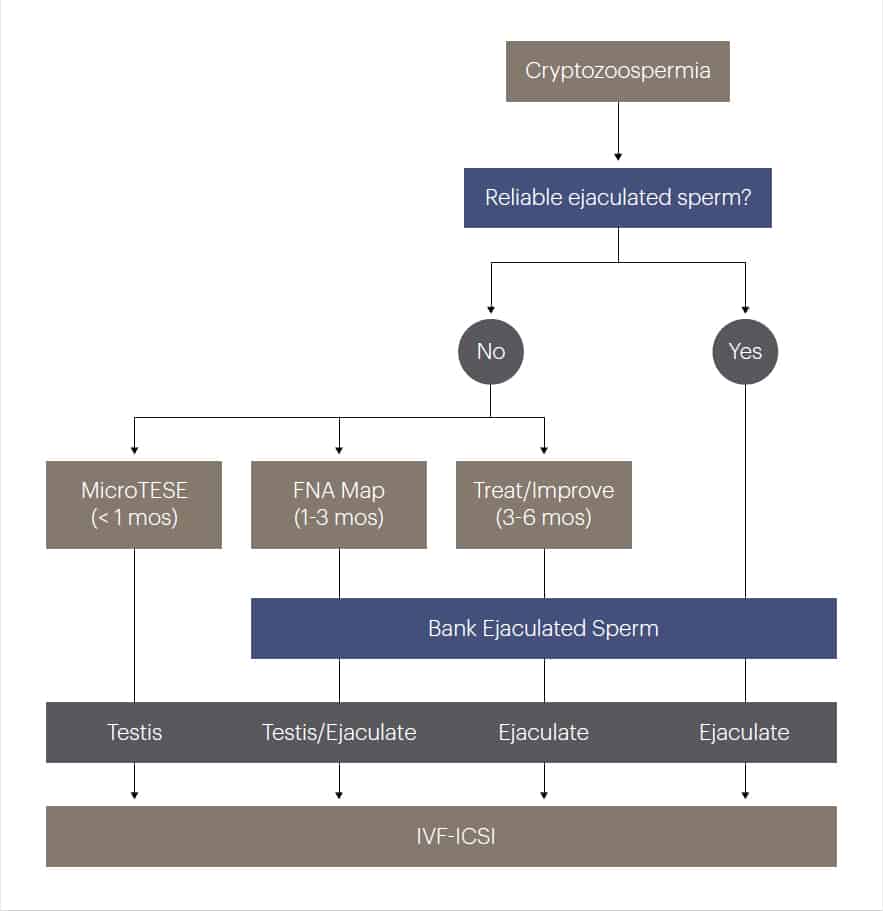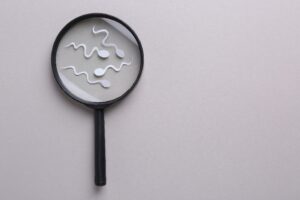Cryptozoospermia in Los Angeles & San Francisco
Finding “Hidden” Sperm that Others Miss

Cryptozoospermia, also termed “virtual azoospermia,” is a condition in which virtually no sperm is observed in a fresh semen sample —they are only discovered after an extensive search. Because there are so few sperm in the ejaculate, they are incredibly difficult to find and very easy to miss.
When there is a miniscule amount of sperm in the ejaculate, the chances of the sperm reaching and fertilizing an egg and leading to pregnancy are slim. But with the help of Beverly Hills male infertility expert Dr. Paul Turek, it is possible to achieve pregnancies. Dr. Turek offers advanced medical solutions to find and use even the smallest numbers of sperm to help you and your partner conceive.
Causes of Cryptozoospermia
Some cases of cryptozoospermia are caused by a problem with the way sperm is produced in the testes. This can occur for hormonal reasons, such as a problem with the normal pituitary hormonal stimulation of the testicles to produce sperm. Or, there may be a problem with the testicle itself, caused by genetic abnormalities, injuries, infections or improper descent of the testicle into the scrotum at birth. Another common condition that interferes with sperm production is a varicocele, which is a network of enlarged veins in the scrotum. Varicoceles cause the testes to “overheat,” thereby reducing their capacity to make sperm.
In some cases of cryptozoospermia, sperm is produced normally in the testes but there is a problem with the way sperm is delivered to the ejaculate. There may be a blockage in the ducts beyond the testicle that carry the ejaculate or an ejaculatory disorder that prevents semen from exiting the penis.
Dr. Turek’s goal is to determine whether cryptozoospermia is caused by sperm production or delivery problems. To do this, he takes a detailed medical history, performs a complete physical exam and examines hormone levels and lab studies such as ultrasounds to identify the root cause of cryptozoospermia. This information helps to guide treatment.
A Thorough Semen Analysis Can Find “Hidden” Sperm

With cryptozoospermia, the sperm count is so low that the sperm are very difficult to find and easy to miss. Results of a semen analysis can vary from test to test and lab to lab. A quick look at the semen analysis might show a zero sperm count (azoospermia). But, a harder and longer look might find small numbers of sperm. Finding even small numbers of sperm in the ejaculate can eliminate unnecessary surgery on the testicle to find sperm, along with its associated effort, expense and risk.
Dr. Turek will try to diagnose your condition correctly and help you avoid the time, expense and risk of unnecessary surgical treatments. He asks for two semen samples for analysis, as the second sample may turn up sperm even if the first does not. Then, his trusted lab with years of experience performs a very thorough semen analysis, including evaluating the concentrate portion of centrifuged semen. During the test, the sperm is spun in a centrifuge to concentrate the sperm cells into a tiny, pinhead sized pellet. This makes it easier to search for and detect sperm using a microscope. A centrifuged pellet assessment can detect sperm in 10 to 20 percent of men in whom a routine semen analysis shows no sperm.
In most cases, men with very few ejaculated sperm can become fathers without needing surgery. Beverly Hills expert Dr. Turek’s research has shown that the odds of needing sperm retrieval procedures are very low when small numbers of ejaculated sperm are reliably found. In addition, his experience using these rare sperm has been very favorable and similar to that of using harvested testicular sperm. Through harvesting small numbers of sperm from these semen samples, collecting and freezing them, sufficient sperm numbers are made available for in vitro fertilization (IVF) and intracytoplasmic sperm injection (ICSI) to achieve pregnancy.
To learn more about treatments for cryptozoospermia, please request an appointment with Dr. Turek at The Turek Clinic. Contact us today to schedule your visit.

Cryptozoospermia FAQs
Is there a difference between cryptozoospermia and azoospermia?

Yes. Azoospermia means there are no sperm in the ejaculate, even after centrifugation and thorough analysis. Cryptozoospermia, also termed “virtual azoospermia” means that sperm are found, but only after careful searching. That small difference matters since it may eliminate the need for testicular surgery and open the door to less invasive treatment.
Can hormone therapy improve sperm production in men with cryptozoospermia?
Yes, in some cases. If the issue stems from a hormonal imbalance — like low FSH or LH — carefully managed hormone therapy may stimulate the testicles to increase sperm production. But hormone therapy isn’t a one-size-fits-all fix; it works best in men with clear evidence of secondary hypogonadism, where the testicles have untapped potential but need a nudge from the brain.
Are there supplements or medications that help with cryptozoospermia?
Dr. Turek often explores medical therapy before recommending surgery. Some men may benefit from off-label medications like clomiphene citrate, anastrozole, or HCG, which can support natural testosterone production and sperm output. Antioxidant supplements such as CoQ10, L-carnitine, and vitamins C and E may also improve semen quality, but always under professional guidance.
What are the chances of pregnancy if I have cryptozoospermia?
The good news: if sperm are present (even in ultra-low numbers) Dr. Turek’s lab can often freeze and preserve them for use in IVF with intracytoplasmic sperm injection (ICSI). Pregnancy success rates using these “hidden” sperm can be similar to those using surgically retrieved testicular sperm. With the right treatment and assisted reproduction, becoming a biological father is possible.
How is sperm retrieved in severe cases of cryptozoospermia?
If no motile sperm are found in multiple centrifuged semen samples, the next step may involve looking at the testicle where sperm are made and may also involve surgical sperm retrieval. Although microdissection TESE has been used, it is a very invasive surgical procedure. Dr. Turek pioneered Sperm Mapping, a minimally invasive way to locate sperm in the testicle, especially in men with severe production issues.
Can men with cryptozoospermia conceive naturally?
Natural conception is unlikely with such low sperm counts, but not impossible. If sperm are found consistently in the ejaculate, timed intercourse during peak fertility days may offer a chance, but it is slim. That said, most couples will need the help of assisted reproductive technology (ART) to achieve pregnancy.
Can lifestyle changes improve cryptozoospermia?
Absolutely. Lifestyle isn’t the full story, but it plays a role. Smoking (tobacco or marijuana), obesity, alcohol overuse, stress, and exposure to environmental toxins like heat (hot baths), chemicals, and endocrine disruptors may worsen sperm production. Improving overall health—think balanced diet, regular exercise, better sleep, stopping recreational drugs—can support your fertility.
What are the costs associated with cryptozoospermia treatment?
Costs can vary depending on diagnostic workup, lab analysis, medical treatment, sperm freezing, and any assisted reproduction techniques used. At The Turek Clinic, the goal is to minimize unnecessary procedures and offer high-value care tailored to your case.
Does insurance cover treatment for cryptozoospermia?
It depends. Many insurance plans do not cover fertility treatments, but some may cover diagnostics, hormone testing, or medication. Our team can help you understand your benefits and guide you through financing options if needed.
Is sperm donation an option for men with cryptozoospermia?
It’s an option, but usually a last resort. Dr. Turek’s track record of finding and using rare ejaculated or testicular sperm means most men won’t need donor sperm to become fathers.









